- Home
- Franklin Horton
The Ungovernable Page 2
The Ungovernable Read online
Page 2
“Oh shit,” Stanley mumbled. “I wonder what happened.”
"There's a lot of snow and ice right now,” Davis said. “It's possible there was an ice dam beneath a bridge somewhere downstream. With no one to report it and no one to clear it, the water could have backed up into the plant.”
“That’s a huge loss,” Gordon said. “They had this place up and running. I remember someone saying it was ready to start transmitting power.”
"Well, I don't know what the hell's going on," said Stanley, "but I hope our guy is not one of the bobbers you see down there. If so, we just wasted a lot of fuel for nothing."
“Can you tell where the signal originates from?” Gordon asked.
"Sixty-five meters from our position," Davis said. “To my ten o’clock.”
In the cabin of the chopper, Gordon worked to translate those coordinates onto the terrain visible through his night vision. “There! A catwalk with some type of structure along it.”
Davis activated a device on the control panel. Their chopper was equipped with Star SAFIRE II thermal imaging. A display illuminated in the cockpit. Davis worked a joystick and maneuvered the gimbal-mounted device until it was pointed at something similar to what Gordon was describing.
"Affirmative on a heat signature in the structure. There's someone in there," Davis said.
"Get me over top of them!" Gordon shouted.
“Can I activate the lights?” Stanley asked. “We don't know what's down there and I don’t want you impaled on some piece of steel like a human shish kebab."
Gordon killed his night vision and swung it out of the way. “Go for it.”
Stanley toggled a lever. The landing lights and nose-mounted searchlight burst to life, washing the scene below them in a harsh glow. The entire crew stared down at the carnage revealed by the glare of the spotlight. Dark floodwaters surged around equipment and buildings that had likely been critical to operating this facility. Stray gear and crates of supplies bobbed in eddies.
Most concerning was the number of bodies floating or snagged on the structures. Some wore snow camo, which may have provided excellent concealment before the flood, but now revealed them in stark contrast to the dark river water. Others wore bright red parkas, which Gordon remembered from the engineers they’d recently ferried to this location.
"Poor bastards." Gordon shook his head. “Get me over that structure.”
His pilots were more cautious than he was but perhaps that was the nature of pilots. Gordon had dropped into every manner of shit-storm all over the world. He’d done combat rescues, been a door gunner, dropped onto oil platforms, and retrieved shipwreck victims from cold seas. This seemed rather straightforward compared to some of the things he’d experienced.
Davis carefully positioned the chopper over top of the metal structure built into the network of scaffolding and catwalks. They could all see that it had been a good decision to use the lighting. The place was a maze of support cables, power transmission wires, and conveyor systems. It was a chopper pilot’s worst nightmare.
Stanley abandoned his seat and clipped into a tether. In the open doorway, Gordon clipped the hoist line onto his rescue harness. He was nearly ready to swing out on the hoist cable when the copilot patted him on the back. Gordon twisted around to see Stanley holding a short, suppressed weapon out to him.
“You think I’ll need that?” Gordon asked.
“Do you know for certain that you won’t?” Stanley countered.
Gordon conceded the point. He’d done so many rescues that he sometimes forgot he was a warrior dropping into the unknown. He slung the rifle around his neck, then wrapped both hands around the cable, and swung gently from the open door of the chopper. He dangled in the air a moment, taking in the scene below him.
"First floor, please!" he said into his microphone.
"Roger that,” Stanley replied. “Going down. First floor. Shoes, housewares, and lingerie.” He pushed a button on the pendant control and Gordon began a steady descent.
Despite the turmoil beneath them, there were no weather conditions complicating the operation, other than the freezing weather. As he dropped, Gordon watched the pattern of the rotor wash in the water. He readied his weapon, making certain a round was chambered and the optic was powered up.
From the cockpit, Davis made small adjustments of the aircraft’s position in order to put Gordon directly where he wanted him. He skillfully dropped him as far as the catwalk railing. They’d done similar operations enough that both men knew exactly what to do. Davis paused there, allowing Gordon to hook a foot onto the yellow pipe rail and center his body where he needed to go. When Davis got the signal that Gordon was ready, he lowered him the final feet.
When Gordon’s boots hit the deck, he immediately unclipped from the hoist line and dropped to a crouch, scanning for threats. He took in his surroundings through the holographic sight on his weapon. He had no indication that he was dropping into a hostile situation. While they’d seen no bullet-riddled bodies or signs of battle, they’d been wrong before. It was a dangerous world and he needed to be ready to press the trigger if things got sketchy.
When he felt it was safe, he hurried toward the pale green structure just down the catwalk from his position. According to the thermal imaging and the satellite beacon, their target was in there. The structure appeared to be a single room, perhaps a control station or office built into the superstructure around the plant. It was around twelve feet wide and sixteen feet from end to end. There was a single steel door opening onto the catwalk in front of Gordon and he expected there was one on the other side, though he couldn’t see it from where he stood.
He flattened himself against the wall and tried to listen for any sound, but all he could hear was the steady pounding of rotors above him. He cautiously tried the knob and it turned in his hand. Unlocked. Normally, he would throw open the door and step clear of the opening, waiting to see if anyone took a shot at him. The problem here was that the door was the width of the catwalk. Once the door was open, there was nowhere to hide.
With his weapon shouldered, he threw open the door and rushed into the room. There was ambient illumination from the chopper lighting and an emergency fixture in the room. He went to his right, rapidly scanning the room through his optic. He checked every quadrant of the chamber, quickly taking in the sparse contents: a desk, a couple of cheap plastic chairs, and a computer. Then Gordon saw something he’d missed. He’d been looking for something higher. Something more obvious. It was a man slumped in the corner, his back against the wall.
“Hands up! Hands up!” Gordon bellowed. He needed to identify the man before he let his guard down.
A low, guttural laugh came from the dark corner. “I hope that’s a fucking joke.”
“No joke!” Gordon shouted, wanting to make sure that his instructions were crystal clear over the sound of the chopper. “Hands up! Identify yourself!”
Boss extracted his arms from beneath the warmth of the rugs he’d covered himself with. He raised a single hand into the air. Then he raised the stump of forearm where his other hand had been.
“Shit,” Gordon uttered. He approached Boss cautiously, rifle leveled on him, and nudged the rugs off with his toe. He needed to make certain there were no weapons concealed beneath them. What he found was a naked and bloodstained man with a satellite beacon laying beside him. “Can you identify yourself?”
Boss shook his head. “That’s above your paygrade, soldier. Better you don’t know.”
“I need a name. Some way of identifying you.”
“Captain Ballou,” Boss mumbled.
Gordon knew this had to be their target. “I think I found our guy,” he said into his mic. “Identifies himself as Captain Ballou. He's naked, possibly hypothermic, and has suffered a traumatic amputation of the right hand.”
“He’s conscious?” Davis asked.
“Affirmative.”
"Do you need a rescue basket?"
"Do we even
have a rescue basket?"
"We have a backboard but no basket," Stanley stated.
"Forget it. Drop me a rescue harness, a blanket, and something to put this guy’s gear in.”
"Stand by," Stanley said.
Gordon returned to the catwalk and shielded his eyes against the spotlight. He watched the winch cable retract and then lower again, painfully slow, with a duffel bag attached. He unclipped the bag, went inside, and dumped the contents on the floor. He turned on his headlamp and began stowing the guy’s gear in the bag. All he found was the emergency beacon, his clothing, and web gear. He shut the duffel and tossed it toward the door.
"I need to lift you out of here in a rescue harness. Do you have any other injuries besides the obvious? I don’t want to make them worse.”
“Just the hand,” Boss said, sounding exhausted.
Gordon helped Boss to his feet, replacing the grimy carpets with a wool blanket. “This will be slightly drafty until we get you out of here. We’ve got more blankets in the chopper.”
He buckled the harness securely around the blanketed man, then grabbed the duffel bag and slung it over his shoulder. He got Boss in front of him and steered him out the door and down the catwalk, his muscles going rigid at the buffeting blasts of cold air stirred up by the rotors. Gordon’s weapon clanged against the pipe railing as they walked.
He delivered Boss to the waiting hoist line and clipped him in, stepped back, and signaled Stanley that it was safe to lift him. “Ground clear. Lift the load.”
Boss hooked his good hand around the line, steadying himself as the hoist took up his weight and he went airborne. Gordon watched sympathetically, knowing that the nearly naked man had to be freezing. Surely that discomfort was secondary to the severed appendage, though.
The lift seemed to take forever. Gordon volleyed between watching Boss rise toward the chopper and scanning for any other survivors. All he saw were dead men bobbing in the water. Judging by the uniforms, some were part of whatever force this injured man was part of. Others appeared to be international troops, and some he couldn't identify at all.
"Got him. Load secure in aircraft," Stanley said in his headset. "Coming back at you."
When the hoist line was within reach, Gordon grabbed it and guided the snap fastener to his harness. He clipped the duffel bag into the hook separately, not wanting the weight to throw him off balance as he was lifted back to the chopper. His weapon he kept at hand, ready to return fire if he drew unwanted attention.
“Lift the load,” Gordon said, giving a thumbs up gesture to the chopper.
The slack disappeared and his feet were lifting off the ground. He spun slowly as he soared away from the catwalk and the rising waters. He couldn’t help but look at the bodies again, wondering what had caused such destruction that only one man survived.
When the hoist was fully retracted, Stanley shot out a hand and latched onto his harness, tugging Gordon toward the chopper deck. Once his feet were firmly planted, he snapped into the chopper’s safety tether and removed the hoist line from his harness. Stanley shut the door.
“All personnel secure in the aircraft. Rear is ready and secure,” Stanley said into his headset.
Gordon pulled a large trauma bag off the wall and dropped to his knees beside the injured man, snapping on a pair of blue nitrile gloves. He checked his patient’s pulse and carefully examined the abrupt termination of Boss’s arm in the harsh glow of his headlamp. Noting that blood continued to seep from the wound, he found another tourniquet in the kit and fastened it above the one Boss had self-applied, successfully stopping the trickle of blood.
"Throw me another blanket," he instructed the copilot. The man did as requested and spread it over Boss, tucking it around him to help retain as much body heat as possible in the cold interior of the chopper. Stanley unclipped from the safety tether and returned to his seat in the cockpit.
The chopper began to rise and Gordon noticed Boss’s eyes widen. “You okay, Captain Ballou?”
“Yeah. Where are we going?”
“My orders were to deliver you to JBAB if I found you alive,” Gordon replied, referring to Joint Base Anacostia-Bolling in southeast Washington D.C.
“Okay.”
Gordon dug back into the trauma bag and came out with a plastic packet which he opened carefully. “Captain, I need to get an IV in you. You’ve lost a lot of blood and we’ve got a two and a half hour chopper ride ahead of us.”
Boss nodded. “Go for it.”
Gordon pulled two bags of normal saline from the trauma kit. There may have been better fluids but it was what he had. He stuck both bags inside his shirt to warm against his skin while he started the IV. Gordon was a pro at this and got the IV started quickly and efficiently despite his cold-numbed fingers, the rocking chopper, and the bad light. When he had it going he hooked up a bag of the warmed saline and hung it from a piece of rigging. He went back into the trauma kit and came out with a hard plastic case.
“What’s that?” Boss asked.
“I’m going to give you something for the pain.”
“What?”
“I’m going to give you something for the pain,” Gordon repeated.
“What medication?”
“Ketamine.”
When Boss didn’t protest, Gordon filled a syringe from a clear glass vial. His mind wandered to the scene he’d just left. “How is it that you’re the only one who survived the flood? Didn’t anybody notice the rising water?”
Boss shook his head. “It wasn’t flooding that killed those men. We came under insurgent attack.”
Gordon stopped what he was doing. “You’re kidding, right?”
Boss stared at Gordon. “Do I look like a kidder?”
Gordon considered the man. He was powerfully-built in the way of men who lived to train and fight. His body was covered with as many scars as tattoos. He was obviously a man who’d devoted his life to...what? The military? Private security? Executive protection?
Gordon shook his head. “No, I guess you don’t seem like you’re in the mood for humor.” He injected the Ketamine then stashed the supplies back in the trauma kit.
Boss took a deep breath, released it, and Gordon could tell the meds were taking effect. Boss’s breathing slowed and the tension in his face eased. It made Gordon feel good that he could ease his pain a bit. He had to be miserable. Besides the cold and the obvious injury, Gordon had no idea what other hardships the man had experienced in the last twenty-four hours. With his patient comfortable, Gordon eased back against the wall and relaxed. He would continue monitoring his patient but the hardest part of the job was over. He was rescued and stabilized.
The flight crew was quiet for most of the return trip to JBAB. That silence happened a lot after missions when the adrenaline ebbed and exhaustion began chewing at the edges of their consciousness.
They came under fire from ground positions three different times. Once was in a rural area between Roanoke and Lexington, Virginia. The second time was over the south side of Richmond. The final incident took place somewhere over the wasteland of Northern Virginia.
This was a regular occurrence anymore. By now, the crew understood that it was not the action of an enemy force. It was probably not an attempt to harm them personally or even to bring down the chopper. It was most likely some poor soul reacting out of resentment, jealous that there was someone who had fuel when they didn't, or angry that someone was able to carry out old world activities when they were not able to do so. Gordon realized that in their same predicament, angry and desperate, he may have acted the same way, firing blindly at a blip soaring across the sky.
Their patient, Boss, was quiet too. He may have been asleep or at least withdrawn to some place where the pain of his injuries was more manageable. The Ketamine seemed to have helped. Gordon administered another dose of the medication once during the flight. As he did so, he studied the man who called himself Captain Ballou. While he hadn’t said much after their initial con
versation, what little he had said gave Gordon a lot to think about.
He couldn’t imagine why insurgents would flood the power plant. Power was one of the things that everybody was asking for. True, food was obviously the top request, but he figured most people would choose the restoration of power over access to fuel. With power restored they might not be able to travel but they would have many of their creature comforts back. For this modern electronic society, addicted to devices, electrical power was the civilizing factor. It was what separated them from the animals, what separated them from undeveloped nations of the world.
The situation was not straightforward. Gordon knew there was widespread dissatisfaction with the conditions the government was attaching to power restoration. They made it simple: if you wanted power, you had to turn in your guns. That simple request struck at the heart of a very divisive issue in America, a nation built on armed resistance to tyranny. Gordon hadn’t heard of any power plants being destroyed, other than in the original attack, but resistance to the government’s plan was not an isolated situation. Even within the ranks of the military, diminished as it was by desertion, there were voices of dissent.
Gordon didn’t take either side in the issue. He was different from a lot of folks in the military. He didn’t come from a military family and was not particularly a gun guy. He was a good shot but he didn't join for the toys or cutting-edge technology. He liked the physical activity, the training, and wanted to have an adventure. He eventually found that the recruiter who’d promised him a life of daily adventure had stretched the truth significantly. Military life involved a lot of waiting.
While he enjoyed his career choice, he was not overly gung-ho about a strict adherence to the constitution. He found himself to be more of a liberal than a conservative. He was patriotic, though not to the point that he would turn on those in power. He understood the conditions attached to the restoration of electrical power and he was cool with it. There were conditions to receiving federal aid and he thought that was okay too. In his mind it was simple: if you wanted to receive aid at a camp, you turned in your weapons and quit griping.

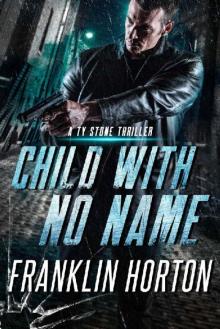 Child With No Name
Child With No Name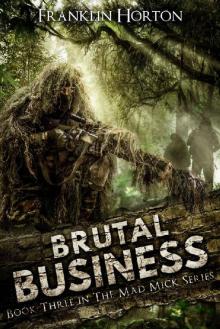 Brutal Business: Book Three in the Mad Mick Series
Brutal Business: Book Three in the Mad Mick Series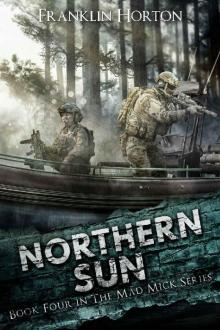 Northern Sun: Book Four in The Mad Mick Series
Northern Sun: Book Four in The Mad Mick Series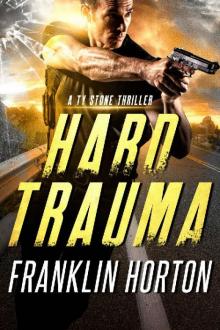 Hard Trauma
Hard Trauma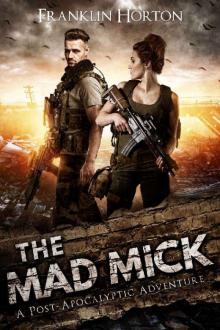 The Mad Mick: Book One of The Mad Mick Series
The Mad Mick: Book One of The Mad Mick Series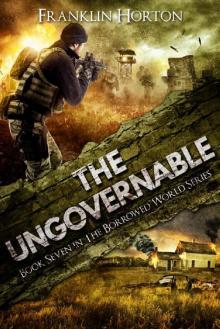 The Ungovernable
The Ungovernable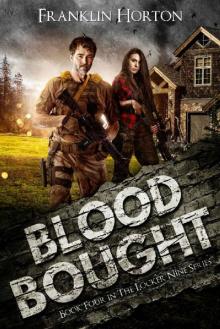 Blood Bought: Book Four in The Locker Nine Series
Blood Bought: Book Four in The Locker Nine Series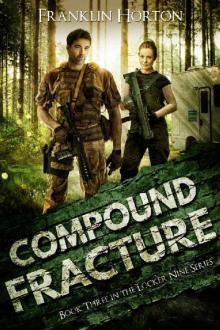 Compound Fracture
Compound Fracture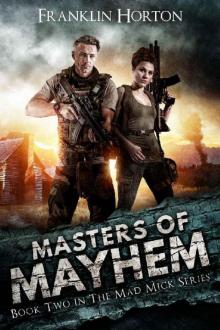 Masters of Mayhem
Masters of Mayhem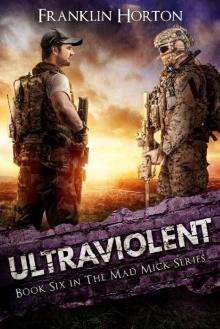 Ultraviolent: Book Six in The Mad Mick Series
Ultraviolent: Book Six in The Mad Mick Series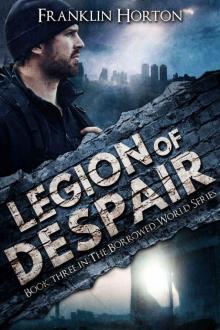 The Borrowed World (Book 3): Legion of Despair
The Borrowed World (Book 3): Legion of Despair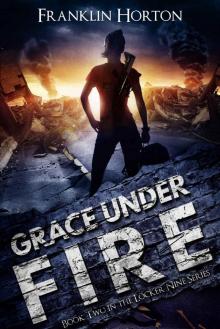 Grace Under Fire: Book Two In The Locker Nine Series
Grace Under Fire: Book Two In The Locker Nine Series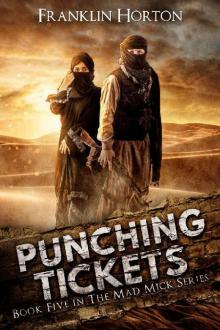 Punching Tickets: Book Five in The Mad Mick Series
Punching Tickets: Book Five in The Mad Mick Series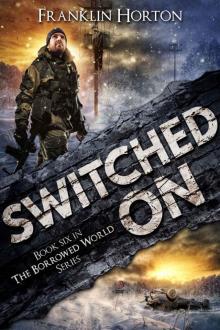 Switched On: Book Six in The Borrowed World Series
Switched On: Book Six in The Borrowed World Series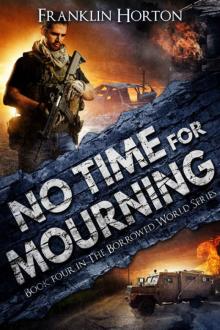 No Time For Mourning: Book Four in The Borrowed World Series
No Time For Mourning: Book Four in The Borrowed World Series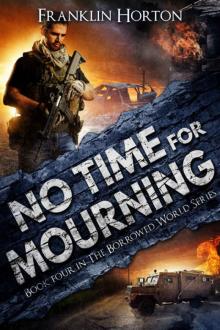 The Borrowed World (Book 4): No Time For Mourning
The Borrowed World (Book 4): No Time For Mourning Random Acts
Random Acts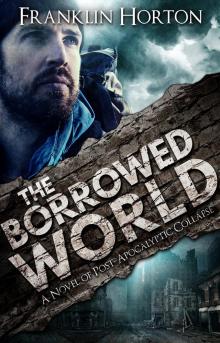 The Borrowed World: A Novel of Post-Apocalyptic Collapse
The Borrowed World: A Novel of Post-Apocalyptic Collapse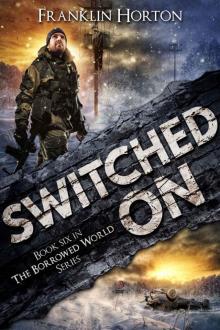 Switched On
Switched On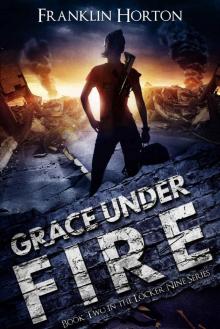 Grace Under Fire
Grace Under Fire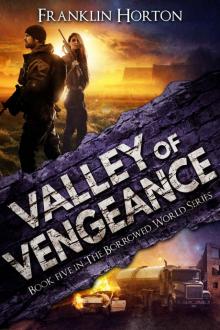 Valley of Vengeance: Book Five in The Borrowed World Series
Valley of Vengeance: Book Five in The Borrowed World Series